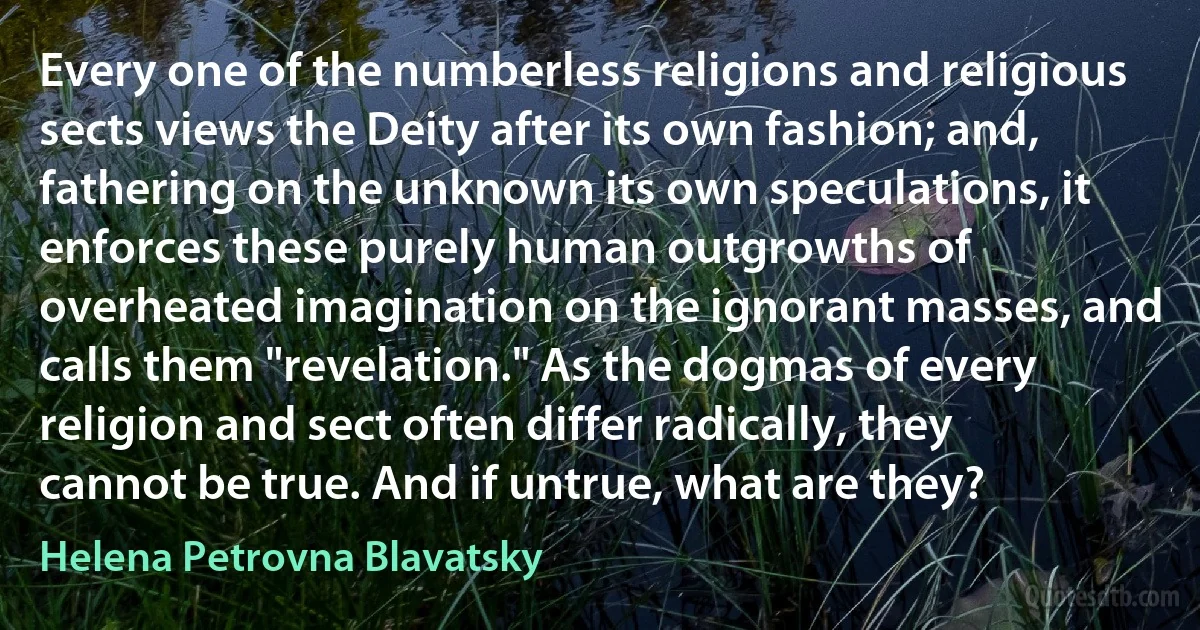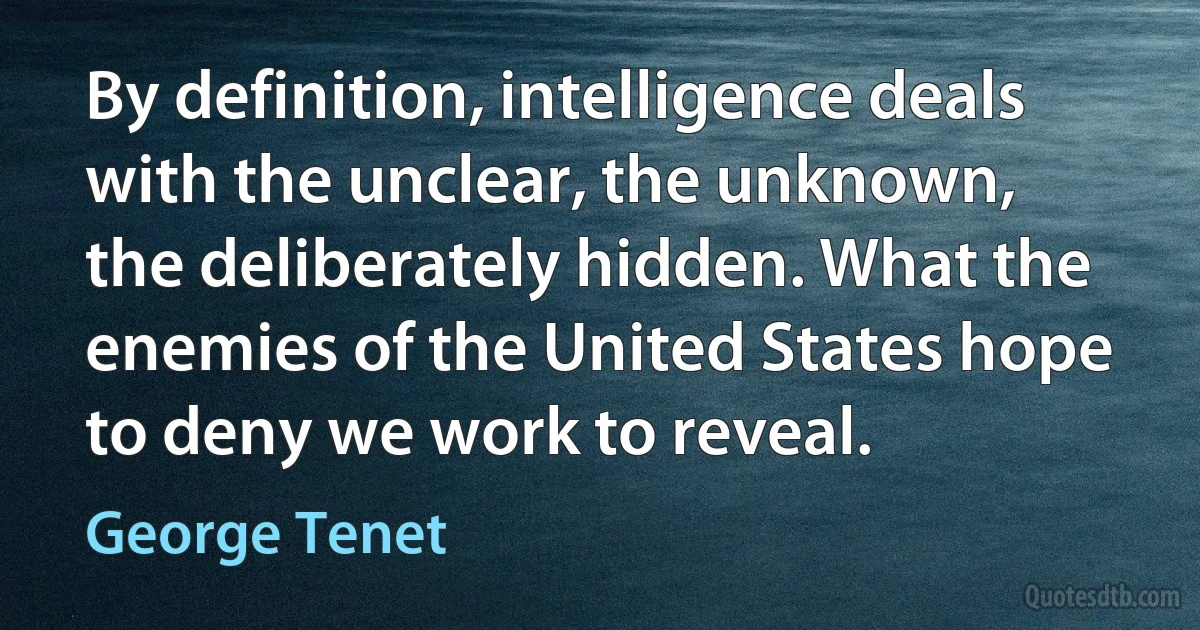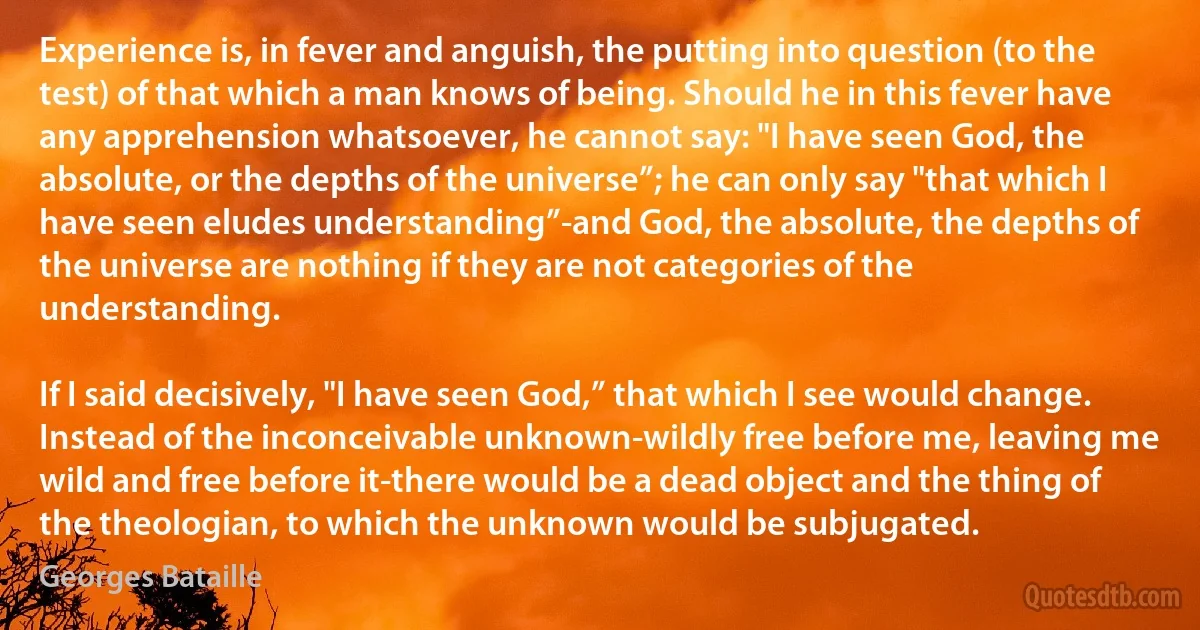Unknown Quotes - page 14
Then through the pallid rift that seemed at first
Hardly enough for a trickle from the suns,
Outpoured the revelation and the flame.
The brief perpetual sign recurred above.
A glamour from unreached transcendences
Iridescent with the glory of the Unseen,
A message from the unknown immortal Light
Ablaze upon creation's quivering edge,
Dawn built her aura of magnificent hues
And buried its seed of grandeur in the hours.

Sri Aurobindo
If man merely sat back and thought about his impending termination, and his terrifying insignificance and aloneness in the cosmos, he would surely go mad, or succumb to a numbing sense of futility. Why, he might ask himself, should he bother to write a great symphony, or strive to make a living, or even to love another, when he is no more than a momentary microbe on a dust mote whirling through the unimaginable immensity of space?...
Those of us who are forced by their own sensibilities to view their lives in this perspective - who recognize that there is no purpose they can comprehend and that amidst a countless myriad of stars their existence goes unknown and unchronicled - can fall prey all too easily to the ultimate anomie. ... The world's religions, for all their parochialism, did supply a kind of consolation for this great ache ... This shattering recognition of our mortality is at the root of far more mental illness than I suspect even psychiatrists are aware.

Stanley Kubrick
Even nowadays an archaic sense of love-innocence recurs, however briefly, among most young men and women. Some few of these, who become poets, remain in love for the rest of their lives, watching the world with a detachment unknown to lawyers, politicians, financiers, and all other ministers of that blind and irresponsible successor to matriarchy and patriarchy - the mechanarchy.

Robert Graves
But I have seen the unknown dead, those little men of the Republic. It was they who woke me up. If a stranger, an enemy, becomes a thing like that when he dies, if one stops short and is afraid to walk over him, it means that even beaten our enemy is someone, that after having shed his blood, one must placate it, give this blood a voice, justify the man who shed it. Looking at certain dead is humiliating. One has the impression that the same fate that threw these bodies to the ground holds us nailed to the spot to see them, to fill our eyes with the sight. It's not fear, not our usual cowardice. One feels humiliated because one understands–touching it with one's eyes–that we might be in their place ourselves: there would be no difference, and if we live we owe it to this dirtied corpse. That is why every war is a civil war; every fallen man resembles one who remains and calls him to account.

Cesare Pavese
The truth is nobody finances tiny movies anymore. I mean there are so many movies I like that I hope will get their money together. It's a different world than it was when I first started making independent movies. Something is really wrong right now. I was a part of it and things are so different now. You can't make a movie for three million dollars with a kind of known actor. It's impossible. I think in general it has to do with the financial state of the country. It's tough for everybody in every business, but the independent movies have really suffered I think...they would never have made Secretary. They never would have financed Secretary with an unknown actress and James Spader. There's just no way.

Maggie Gyllenhaal
Fellow citizens, we have been called to leadership in a period of consequence. We have entered a great ideological conflict we did nothing to invite. We see great changes in science and commerce that will influence all our lives. And sometimes it can seem that history is turning in a wide arc, toward an unknown shore. Yet the destination of history is determined by human action, and every great movement of history comes to a point of choosing.

George W. Bush
I myself, as a person, have been influenced by many writers and many things, and my writing has felt the impact of the writing of many writers, some relatively unknown and unimportant, some downright bad. But probably the greatest influence of them all when an influence is most effective - when the man being influenced is nowhere near being solid in his own right - has been the influence of the great tall man with the white beard, the lively eyes, the swift wit and the impish chuckle.

William Saroyan
Yonder in the unknown vastness"-his long finger stabbed at the black silent jungle which brooded beyond the firelight-"yonder lies mystery and adventure and nameless terror. Once I dared the jungle-once she nearly claimed my bones. Something entered into my blood, something stole into my soul like a whisper of unnamed sin. The jungle! Dark and brooding-over leagues of the blue salt sea she has drawn me and with the dawn I go to seek the heart of her. Mayhap I shall find curious adventure-mayhap my doom awaits me. But better death than the ceaseless and everlasting urge, the fire that has burned my veins with bitter longing.

Robert E. Howard
It is not unknown to those who know any Thing of publike Affairs, of how great Concernment it is, especially in civill Commotions, for those who are to manage such Transactions, to be furnished with continuall Intelligence from their Correspondents, yet so as to conceal their Councells and Resolutions from the adverse Party. And to this Purpose, in all Ages, much Care and lndustry hath been still used, how in Matters of Consequence, to convey Intelligence safely and secretly to those with whom they hold Correspondence, so as not to bee intercepted by the Enemy, or if intercepted, at least not discovered. And as this is no where of more Concernment, so no where more difficult, than in civill Wars, where the intermingling of opposite Parties makes it difficult, if not impossible, to distinguish Friends and Foes.

John Wallis
It is not true, out of geometry, that the mathematical sciences are, in all their parts those models of finished accuracy which many suppose. The extreme boundaries of analysis have always been as imperfectly understood as the tract beyond the boundaries was absolutely unknown. But the way to enlarge the settled country has not been by keeping within it, but by making voyages of discovery, and I am perfectly convinced that the student should be exercised in this manner; that is, that he should be taught how to examine the boundary, as well as how to cultivate the interior. ...allowing all students whose capacity will let them read on the higher branches of applied mathematics, to have each his chance of being led to the cultivation of those parts of analysis on which rather depends its future progress than its present use in the sciences of matter.

Augustus De Morgan



